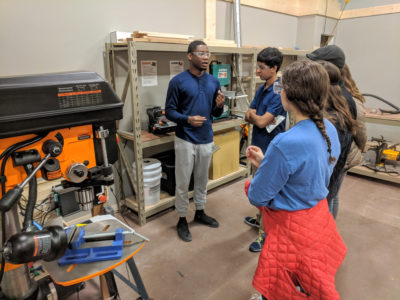Last Saturday night, upwards of a hundred people gathered at The Stew for the Grand Opening of the new Maker Lab. With such a large number present at the unveiling of the site, the Maker Lab received a warm welcome from the Grinnell community.
The Maker Lab, also called the MLab, is a new makerspace and fabrication lab in Grinnell. With a diverse array of supplies readily available for use, the MLab is capable of facilitating woodworking, 3D printing, scanning, carving, laser cutting, metalworking, sewing, and much more. To utilize the facility, one simply needs to visit the Maker Lab in its open times, undergo a brief safety orientation, and receive training.
Operated as a joint partnership between the Grinnell Area Arts Council and the Wilson Center for Innovation and Leadership, one of the main motives in establishing the Maker Lab was to create an accessible and collaborative space for the collective Grinnell community.
“The Maker Lab is free to use for any student in Grinnell,” said Monty Roper, director of the Wilson Center. “This includes not only the Grinnell College students but also students at the high school, the community college, and in the grade schools. It is also available for any member of the community; [for adults], there will be a small fee structure in place for that.” The MLab will charge $30 for a month and $300 for a year for members of the community who are not students.
The creation of the Maker Lab was not a straightforward process: after all, the effort and cost of maintaining such a space, which is usually operated at larger universities, investigation centers, businesses, and other corporate firms, necessitated serious consideration. The plan began with the efforts of Sage Kaplan-Goland ‘20, a physics major who had envisioned the space since his first year.
“So, when I was a first-year, I started an engineering club,” said Kaplan-Goland. “There were four of us in the club, and we got trained by the physics department from their shop tools, but the only way to get trained on the science division tools was to find a friendly professor to train you and only be able to use the shop when the professor was available to supervise.” Such inconveniences had motivated him to seek others’ opinions and assistance in creating a makerspace for students.
“I went around and talked to a lot of people, and I got a lot of ‘no’s,” said Kaplan-Goland. He discussed the matter with the likes of the president of the Board of Trustees, people in facilities management, and more to no avail. “I think I’ve talked to about thirty people before walking into Monty’s office.”
The discussion between Kaplan-Goland and Roper evolved into a full-fledged plan for the program, and after proposals, surveys, and Kaplan-Goland’s trip to the 13th International Fab Lab Conference in Santiago, Chile last year, the Maker Lab has now turned into a reality, funded by the Wilson Center on a three-year trial basis.
Fortunately, when the Grinnell Area Arts Council became involved in the project, the mission and needs of the organization were similar to those of Kaplan-Goland and Roper.
“One of our old programs was called Grin City Collective, it was an artist residency out on a farm,” said Erik Jarvis ‘12, the facilities and events coordinator of the Grinnell Area Arts Council. “That was a space for adults to gather and create, but they spun off to be another program, so The Stew was created for people to actually get together and make things.”
“We invited Sage to meet with us at a staff meeting, and at the time, he was still looking at spaces on campus. Their main idea at that point was the basement of Main Hall, which is super out of the way – unless you live in South Campus, it would be difficult to go there. [I thought,] If you want the community to join, maybe downtown is better.”
“We provided the space, but they’re providing the staff and the equipment to help facilitate that, so it’s cool that we can join forces with our space and knowledge of the community and their resources of money and students who can help teach the equipment. It simply made sense to collaborate.” The shared mission of community engagement and creativity of the Grinnell Area Arts Council and members of the College ultimately enabled the Maker Lab to be located downtown.
“For me, it’s about diversity in learning. It’s about the artists, engineers, and social scientists coming together to think about problem solving,” said Roper. “It is also an opportunity for students to try, fail, to build resilience, try again … The maker culture, in general, not only fits really well with the ideals of a liberal arts education, but also the aspect of problem solving fits with Grinnell’s broader mission to be socially engaged. Grinnell College students and others may discuss problems that they face either at the farm or the classroom and think about the ways in which there may be technological solutions.”
Currently in its first week of operations, the Maker Lab has already been put to good use, with individuals visiting the facility to 3D-print computer parts, make a gift for a family member, scan a skull for an anthropology project, and more.
More information regarding the Maker Lab and ways to get involved with the workspace can be found at makerlab.sites.grinnell.edu.



















































